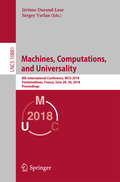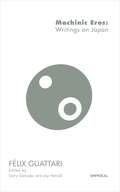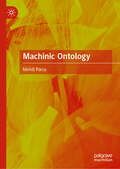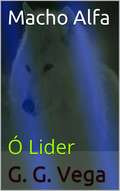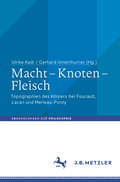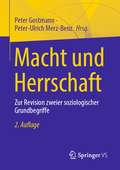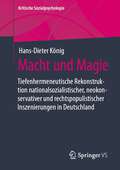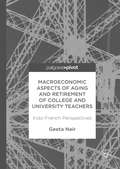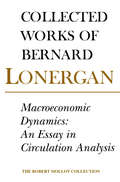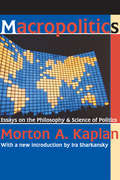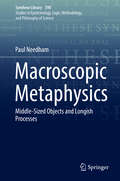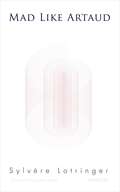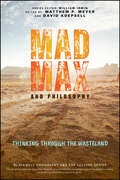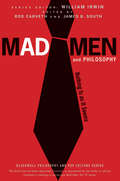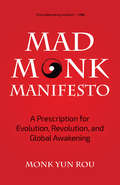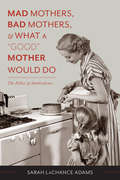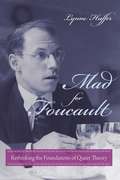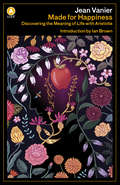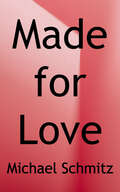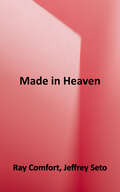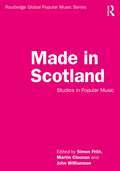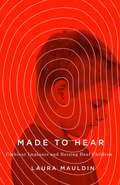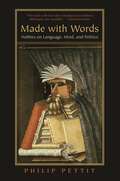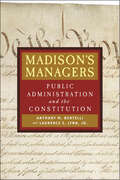- Table View
- List View
Machines, Computations, and Universality: 8th International Conference, MCU 2018, Fontainebleau, France, June 28–30, 2018, Proceedings (Lecture Notes in Computer Science #10881)
by Jérôme Durand-Lose Sergey VerlanThis book constitutes the refereed proceedings of the 8th International Conference on Machines, Computations, and Universality, MCU 2018, held in Fontainebleau, France, in June 2018. The 9 revised full papers presented together with 5 invited talks were carefully reviewed and selected from numerous submissions. MCU explores computation in the setting of various discrete models (Turing machines, register machines, cellular automata, tile assembly systems, rewriting systems, molecular computing models, neural models, concurrent systems, etc.) and analog and hybrid models (BSS machines, infinite time cellular automata, real machines, quantum computing, etc.).
Machinic Eros: Writings on Japan (Univocal)
by Félix GuattariThe French philosopher Félix Guattari frequently visited Japan during the 1980s and organized exchanges between French and Japanese artists and intellectuals. His immersion into the &“machinic eros&” of Japanese culture put him into contact with media theorists such as Tetsuo Kogawa and activists within the mini-FM community (Radio Home Run), documentary filmmakers (Mitsuo Sato), photographers (Keiichi Tahara), novelists (Kobo Abe), internationally recognized architects (Shin Takamatsu), and dancers (Min Tanaka). From pachinko parlors to high-rise highways, alongside corporate suits and among alt-culture comrades, Guattari put himself into the thick of Japanese becomings during a period in which the bubble economy continued to mutate. This collection of essays, interviews, and longer meditations shows a radical thinker exploring the architectural environment of Japan&’s &“machinic eros.&”
Machinic Ontology
by Mehdi ParsaThis book considers the becoming-concept of the machine-metaphor. It explores the intersections between this becoming and the development of the concepts of life, organism, and technics. It seeks to introduce universal machinism as a metaphysical foundation with specific ethical and political implications. A machinic ontology proposes that the whole has no inside, the body has no head, a society needs no leader, and the brain has no center. While undoubtedly a Deleuzoguattarian idea, this book endeavors to explore its origins and echoes across various thinkers and domains. In this context, it examines and analyzes the concepts of monstrous machine, transindividual machine, plastic machine, abstract machine and biopolitical machine as they appear in the works of George Canguilhem, Gilbert Simondon, Catherine Malabou, Gilles Deleuze and Félix Guattari, Michel Foucault, and Giorgio Agamben. Machinic Ontology is essential reading for all scholars and researchers in metaphysics especially those interested in the nature of living and non-living entities and natural systems.
Macho Alfa
by Guido Galeano Vega Eunice T AndreLivro que trata de aspectos sociais e culturais de líderes em grupos animais e humanos. Macho Alfa Este conceito é mais bem aplicado no âmbito da natureza ou no sistema biológico animal. Nas sociedades modernas, é aplicado também para definir certo tipo de pessoas, que se caracterizam por sua capacidade de liderança. Como o conceito tem uma relação mais direta com o mundo animal, e mais ainda vinculado a certas espécies de predadores, implacáveis, de extrema eficiência no processo de caçada grupal, atividade motivada para garantir ou melhorar a possibilidade de sobrevivência em contextos de natureza selvagem, como é o caso dos lobos. Ele tem sido aplicado também nos grupos humanos com um estilo de vida de características similares.
Macht - Knoten - Fleisch: Topographien des Körpers bei Foucault, Lacan und Merleau-Ponty (Abhandlungen zur Philosophie)
by Ulrike Kadi Gerhard UnterthurnerDer "Macht - Knoten - Fleisch. Topographien des Körpers bei Foucault, Lacan und Merleau Ponty" greift eine Reihe von Begriffen und Konzepten der drei Referenzautoren heraus, die für ein zeitgemäßes Verständnis des Körpers entscheidend sind. Bei Foucault wird der Körper von seiner Verflechtung mit Macht und Wissen her thematisiert. Die Knoten, die Körper machen und Körper-Raum-Verhältnisse vorstellen, sind für Lacan relevant. Und Merleau-Ponty bietet mit Stichworten wie der leiblichen Praxis, der Zwischenleiblichkeit oder des „Fleisches des Welt“ weitere theoretische Facetten, die es zu berücksichtigen gilt. Der Band versteht sich nicht nur als ein Beitrag zu einem Dialog über den Körper zwischen Genealogie, Psychoanalyse und Phänomenologie. Sondern der Band ist als Brückenkopf für einen Wissenstransfer zu anderen Körperwissenschaften konzipiert. Er richtet sich daher an Lehrende, Forschende und Lernende aus Disziplinen, die sich mit dem Körper beschäftigen. Gleichermaßen soll er interessierten Laien ein Werkzeug zur Einordnung und Bearbeitung von neuen Phänomenen in, an und mit dem Körper an die Hand geben.
Macht und Herrschaft: Zur Revision zweier soziologischer Grundbegriffe
by Peter Gostmann Peter-Ulrich Merz-BenzDas Buch befasst sich mit Kernbegriffen der Sozialwissenschaften: Macht und Herrschaft. Mit Beiträgen von Gerhard Wagner, Guy Oakes, Hubert Treiber, Peter Gostmann, Peter-Ulrich Merz-Benz, Dirk Tänzler und Stephen Turner.
Macht und Magie: Tiefenhermeneutische Rekonstruktion nationalsozialistischer, neokonservativer und rechtspopulistischer Inszenierungen in Deutschland (Kritische Sozialpsychologie)
by Hans-Dieter KönigDieses Buch beantwortet die sozialpsychologische Frage, wie politische Akteure und Akteurinnen die Mehrheit der Deutschen für partikulare Machtinteressen eingenommen haben. Die tiefenhermeneutische Analyse zeigt, wie politische Reden ihre Wirkung durch eine Magie der Worte und durch magische Inszenierungen entfalten.
Macroeconomic Aspects of Aging and Retirement of College and University Teachers: Indo-French Perspectives
by Geeta NairThis book explores the universal and highly topical issues of ageing and retirement. It places a particular focus on the macroeconomic aspects of the ageing and retirement of college and university teachers, through a case study of teachers and professors in France and India. While the ageing of the population and the financing of the pension system are notoriously pressing issues in Western nations such as France, it has previously not been acknowledged that these issues are also critical to the development trajectory of emerging countries such as India. The book also highlights the importance of pensions for welfare, well-being and stability in all categories of workers, including workers in the informal sector and private companies devoid of pension schemes, where jobs are largely irregular and temporary in nature. It will be of great interest to researchers in the fields of comparative education, sociology and economics.
Macroeconomic Dynamics: An Essay in Circulation Analysis, Volume 15
by Bernard Lonergan Charles Hefling Jr. Frederick Lawrence Patrick ByrneFew theologians in history have matched Bernard Lonergan's range of learning. Fewer still have written on the "dismal science" of economics. Rooted so solidly in the concerns of this world, economics is not a discipline we associate with the more rarified pursuit of theology. In this long-awaited volume, Lonergan demonstrates the short-sightedness of this view. This companion volume to For A New Political Economy (Collected Works of Bernard Lonergan, Volume 21) continues the work of bringing together the various elements of Lonergan's economic thought. His economic writings span forty years and represent one of the most important intellectual achievements of the twentieth century. They have previously been inaccessible outside of the Lonergan research community as the majority of them have not been formally published, and exist only as a group of unfinished essays and material for courses on economics taught by Lonergan. Lonergan's economic ideas track a different line of thought from that taken by contemporary economists. Macroeconomic Dynamics: An Essay in Circulation Analysis represents the economic thought of Lonergan at the end of his career. His analysis, while taking a fresh look at fundamental variables, breaks from centralist theory and practice towards a radically democratic perspective on surplus income and non-political control, and explores more fully the ideas introduced in For a New Political Economy. This work will be read not only by economists but also by liberation theologians, political theologians, and others inside and outside of religious organizations interested in social justice issues and alternative approaches to economics.
Macropolitics: Essays on the Philosophy and Science of Politics
by Friedrich MeineckeA selection of essays by a pioneer in the application of systems theory to political analysis, Macropolitics develops the author's concern with the philosophical foundations of political science, and with the extension of philosophical principles into the realm of empirical analysis. For this volume, Kaplan has written a long essay on the philosophical foundations of his work, which constitutes one of his most important statements. He develops and explains within a philosophical context his contention that values can be treated in an empirically meaningful fashion. Organized to expand or illustrate the major points raised in this introduction, the essays that follow deal with such topics as the nature and utility of systems theory, empirical treatment of historical explanations, the systemic and psychological foundations of values, and empirical applications of systems theory in analyzing international political systems. Enlarging the dialogue between conflicting viewpoints, Kaplan exposes the common roots of Western scientific thought and Marxist philosophy, emphasizing that both status quo and revolutionary philosophies are one-sided. In his new introduction, Ira Sharkansky sees this as a truly groundbreaking work: "thanks in considerable part to the contributions of Professor Kaplan, international relations theory is a major component of political sciencei?1/2a milestone on our quest for understanding i?1/2 a distinguished part of the ongoing record." When the book first appeared, William Welch in the American Political Science Review called it "excellent: his weighing against the evidence of competing hypotheses is truly exemplary i?1/2 thorough, careful, fair-minded."
Macroscopic Metaphysics: Middle-Sized Objects and Longish Processes (Synthese Library #390)
by Paul NeedhamThis book is about our ordinary concept of matter in the form of enduring continuants and the processes in which they are involved in the macroscopic realm. It emphasises what science rather than philosophical intuition tells us about the world, and chemistry rather than the physics that is more usually encountered in philosophical discussions. The central chapters dealing with the nature of matter pursue key steps in the historical development of scientific conceptions of chemical substance. Like many contemporary discussions of material objects, it relies heavily on mereology. The classical principles are applied to the mereological structure of regions of space, intervals of time, processes and quantities of matter. Quantities of matter, which don't gain or lose parts over time, are distinguished from individuals, which are typically constituted of different quantities of matter at different times. The proper treatment of the temporal aspect of the features of material objects is a central issue in this book, which is addressed by investigating the conditions governing the application of predicates relating time and other entities. Of particular interest here are relations between quantities of matter and times expressing substance kind, phase and mixture. Modal aspects of these features are taken up in the final chapter.
Mad Like Artaud (Univocal)
by Sylvère LotringerThose who are mad like Antonin Artaud, are they just as mad as he was? Madness, like the plague, is contagious, and everyone, from his psychiatrists to his disciples, family, and critics, everyone who gets close to Artaud, seems to participate in his delirium. Sylvère Lotringer explores various embodiments of this shared delirium through what Artaud called &“mental dramas&”—a series of confrontations with his witnesses or &“persecutors&” where we uncover the raw delirium at work, even in Lotringer himself. Mad Like Artaud does not intend to add one more layer of commentary to the bitter controversies that have been surrounding the cursed poet&’s work since his death in 1948, nor does it take sides among the different camps who are still haggling over his corpse. This book speaks of the site where &“madness&” itself is simmering.
Mad Max and Philosophy: Thinking Through the Wasteland (The Blackwell Philosophy and Pop Culture Series)
by William IrwinExplore the philosophy at the core of the apocalyptic future of Mad Max Beneath the stylized violence and thrilling car crashes, the Mad Max films consider universal questions about the nature of human life, order and anarchy, justice and moral responsibility, society and technology, and ultimately, human redemption. In Mad Max and Philosophy, a diverse team of political scientists, historians, and philosophers investigates the underlying themes of the blockbuster movie franchise, following Max as he attempts to rebuild himself and the world around him. Requiring no background in philosophy, this engaging and highly readable book guides you through the barren wastelands of a post-apocalyptic future as you explore ethics and politics in The Wasteland, the importance of costumes and music, humankind's relationship with nature, commerce, gender, religion, madness, and much more. Covers all of George Miller's Mad Max films, including Mad Max: Fury Road Discusses connections between Mad Max and Nietzsche, Malthus, Mill, Foucault, Sartre, and other major philosophers Follows Max's journey from policeman and family man to lost soul in search of redemption Examines the future of technology and possible impacts on society, the environment, and access to natural resources Delves into feminist themes of Mad Max, such as the reversal of heroic gender roles in Fury Road and relationships between power and procreationPart of the bestselling Blackwell Philosophy and Pop Culture series, Mad Max and Philosophy: Thinking Through the Wasteland is a must-read for anyone wanting to philosophically engage with Max, Furiosa, and their dystopian world.
Mad Men and Philosophy: Nothing Is as It Seems (The Blackwell Philosophy and Pop Culture Series #28)
by William IrwinA look at the philosophical underpinnings of the hit TV show, Mad Men With its swirling cigarette smoke, martini lunches, skinny ties, and tight pencil skirts, Mad Men is unquestionably one of the most stylish, sexy, and irresistible shows on television. But the series becomes even more absorbing once you dig deeper into its portrayal of the changing social and political mores of 1960s America and explore the philosophical complexities of its key characters and themes. From Socrates, Plato, and Aristotle to John Kenneth Galbraith, Milton Friedman, and Ayn Rand, Mad Men and Philosophy brings the thinking of some of history's most powerful minds to bear on the world of Don Draper and the Sterling Cooper ad agency. You'll gain insights into a host of compelling Mad Men questions and issues, including happiness, freedom, authenticity, feminism, Don Draper's identity, and more. Takes an unprecedented look at the philosophical issues and themes behind AMC's Emmy Award-winning show, Mad Men Explores issues ranging from identity to authenticity to feminism, and more Offers new insights on your favorite Mad Men characters, themes, and storylines Mad Men and Philosophy will give Mad Men fans everywhere something new to talk about around the water cooler.
Mad Monk Manifesto: A Prescription for Evolution, Revolution, and Global Awakening
by Yun RouWinner of Both Gold & Silver 2018 Nautilus Book Award and #1 New Release in Taoism and Tao Te ChingChange Yourself, Change The WorldFind answers. It’s easy to get outraged by world events, frustrated by our own personal battles, and disenfranchised from government and leadership. Born of moral indignation, informed by decades of study, and seasoned by a life of devoted self-cultivation, Monk Yun Rou’s Mad Monk Manifesto has answers, personal prescriptions, and calls to social and political action in one powerful book.Change the world by changing ourselves. Based on ancient Chinese wisdom such as Lao Tzu’s Tao Te Ching, Mad Monk Manifesto is part tour guide to consciousness, part recipe for personal development, part prescription for environmental salvation, and part handbook for social change.Wise advice for the awakened life. As ripples move away from a stone dropped into a pond, Mad Monk Manifesto begins with our personal lives, discussing diet, exercise, meditation, and mind/body practice. Then it expands to our public environment, describing what we can do to improve our community, government, and the world. Full of everything from advice for a healthy, conscious lifestyle to actions we can take to enhance the lives of friends, family, coworkers, and community members; Mad Monk Manifesto highlights spirituality and service. In addition, Monk Yun Rou encourages everyone to engage in the nature that surrounds them, showing how environmentalism can take place in daily life.Mad Monk Manifesto is precisely what the world needs at a time of unprecedented environmental disasters, international instability, and divisive and unreliable leadership. After reading this book, you will learn:How to relax, rectify, and rebalance lifeHow to bolster the community and deepen cultureHow to effect positive change in commerce, government, power, and the environmentMad Monk Manifesto is for readers of Alan Watts, Eckhart Tolle, and Change Your Thoughts—Change Your Life by Dr. Wayne W. Dyer.
Mad Mothers, Bad Mothers, and What a "Good" Mother Would Do
by Sarah Lachance AdamsWhen a mother kills her child, we call her a bad mother, but, as this book shows, even mothers who intend to do their children harm are not easily categorized as "mad" or "bad." Maternal love is a complex emotion rich with contradictory impulses and desires, and motherhood is a conflicted state in which women constantly renegotiate the needs mother and child, the self and the other. Applying care ethics philosophy and the work of Emmanuel Levinas, Maurice Merleau-Ponty, and Simone de Beauvoir to real-world experiences of motherhood, Sarah LaChance Adams throws the inherent tensions of motherhood into sharp relief, drawing a more nuanced portrait of the mother and child relationship than previously conceived. The maternal example is particularly instructive for ethical theory, highlighting the dynamics of human interdependence while also affirming separate interests. LaChance Adams particularly focuses on maternal ambivalence and its morally productive role in reinforcing the divergence between oneself and others, helping to recognize the particularities of situation, and negotiating the difference between one's own needs and the desires of others. She ultimately argues maternal filicide is a social problem requiring a collective solution that ethical philosophy and philosophies of care can inform.
Mad Mothers, Bad Mothers, and What a "Good" Mother Would Do: The Ethics of Ambivalence
by Sarah LaChance AdamsWhen a mother kills her child, we call her a bad mother, but, as this book shows, even mothers who intend to do their children harm are not easily categorized as "mad" or "bad." Maternal love is a complex emotion rich with contradictory impulses and desires, and motherhood is a conflicted state in which women constantly renegotiate the needs mother and child, the self and the other. Applying care ethics philosophy and the work of Emmanuel Levinas, Maurice Merleau-Ponty, and Simone de Beauvoir to real-world experiences of motherhood, Sarah LaChance Adams throws the inherent tensions of motherhood into sharp relief, drawing a more nuanced portrait of the mother and child relationship than previously conceived. The maternal example is particularly instructive for ethical theory, highlighting the dynamics of human interdependence while also affirming separate interests. LaChance Adams particularly focuses on maternal ambivalence and its morally productive role in reinforcing the divergence between oneself and others, helping to recognize the particularities of situation, and negotiating the difference between one's own needs and the desires of others. She ultimately argues maternal filicide is a social problem requiring a collective solution that ethical philosophy and philosophies of care can inform.
Mad for Foucault: Rethinking the Foundations of Queer Theory (Gender and Culture Series)
by Lynne HufferMichel Foucault was the first to embed the roots of human sexuality in discipline and biopolitics, therefore revolutionizing our conception of sex and its relationship to society, economics, and culture. Yet over the past two decades, scholars have limited themselves to the study of Foucault's History of Sexuality, volume 1 paying lesser attention to his equally explosive History of Madness. In this earlier volume, Foucault recasts Western rationalism as a project that both produces and represses sexual deviants, calling out the complicity of modern science and the exclusionary nature of family morality. By reclaiming these deft moves, Lynne Huffer teases out exciting new strands of Foucauldian thought. She then revisits the theorist's ethical work in light of these discoveries, divining an ethics of eros that sees sexuality as a lived experience we are repeatedly called on to remember. Throughout her study, Huffer weaves her own experiences together with Foucault's, sampling from unpublished interviews and other archived materials in order to intimately rework the problem of sexuality as a product of reason.
Made for Happiness: Discovering the Meaning of Life with Aristotle
by Jean VanierThis bestselling work is an uplifting and practical look at philosophy and how it can be applied in our everyday lives from the author of the international bestseller, Becoming Human.In Made for Happiness, Jean Vanier examines the basis for modern moral philosophy and its role in our lives today. Having discovered through his work with the intellectually disabled the degree to which our society is divided, and our values misplaced, Vanier invites us to read with fresh eyes theories of happiness written 2,400 years ago.The book follows the links between psychology, spirituality, and morality: psychology helps us face our fears and limitations; spirituality gives us strength; and morality helps us to choose the best actions, those that will make us happier, and thus more human. The combination of these paths to knowledge and wisdom gives meaning to our lives and allows us to make the best use of our freedom on our way to happiness.
Made for Love: Same-Sex Attraction and the Catholic Church
by Michael SchmitzIn Made for Love, Fr. Michael Schmitz presents the Catholic teaching on same-sex attraction and same-sex "sexual" relations. <p><p>He begins by giving background information regarding the different worldviews of the human person, the philosophical ideas of nature and purpose, the differences between objective and subjective truth, the principal of non-contradiction, and the fallen human nature that resulted from Original Sin. He then discusses in great detail the nature and ends of human sexuality and the nature of true love, while, in a compassionate and non-judgmental way, explaining the flawed nature of same-sex "sexual" relations. <p><p>While this book is intended primarily for those who have same-sex attraction and their family and friends, its presentation of the compassionate truth of Catholic teaching on same-sex attraction will be of great benefit to everyone in today's society.
Made in Heaven: Man's Indiscriminate Stealing of God's Amazing Design
by Ray Comfort Jeffrey SetoEngineers have long examined God's creation to understand and mimic complex, proven mechanics of design. They have plumbed the depths of the natural world, encompassing insects and plants to man in search of wisdom and insight. The simplicity yet intricacy of how God designs work and how He manufacturers complexity in nature astounds and inspires engineers in hypothesis and designs that could not be formed otherwise.
Made in Scotland: Studies in Popular Music (Routledge Global Popular Music Series)
by John Williamson Simon Frith Martin CloonanMade in Scotland: Studies in Popular Music serves as a comprehensive and thorough introduction to the history, politics, culture, and musicology of twentieth- and twenty-first-century popular music in Scotland. The volume consists of essays by local experts and leading scholars in Scottish music and culture, and covers the major figures, styles, and social contexts of popular music in Scotland. Each essay provides adequate context so readers understand why the figure or genre under discussion is of lasting significance. The book includes a general introduction to Scottish popular music, followed by essays organized into three thematic sections: Histories, Politics and Policies, and Futures and Imaginings. Examining music as cultural expression in a country that is both a nation and a region within a larger state, this volume uses popular music to analyse Scottishness, independence, and diversity and offers new insights into the complexity of cultural identity, the power of historical imagination, and the effects of power structures in music. It is a vital read for scholars and students interested in how popular music interacts with and shapes such issues both within and beyond the borders of Scotland.
Made to Hear: Cochlear Implants and Raising Deaf Children (A Quadrant Book)
by Laura MauldinA mother whose child has had a cochlear implant tells Laura Mauldin why enrollment in the sign language program at her daughter&’s school is plummeting: &“The majority of parents want their kids to talk.&” Some parents, however, feel very differently, because &“curing&” deafness with cochlear implants is uncertain, difficult, and freighted with judgment about what is normal, acceptable, and right. Made to Hear sensitively and thoroughly considers the structure and culture of the systems we have built to make deaf children hear.Based on accounts of and interviews with families who adopt the cochlear implant for their deaf children, this book describes the experiences of mothers as they navigate the health care system, their interactions with the professionals who work with them, and the influence of neuroscience on the process. Though Mauldin explains the politics surrounding the issue, her focus is not on the controversy of whether to have a cochlear implant but on the long-term, multiyear undertaking of implantation. Her study provides a nuanced view of a social context in which science, technology, and medicine are trusted to vanquish disability—and in which mothers are expected to use these tools. Made to Hear reveals that implantation has the central goal of controlling the development of the deaf child&’s brain by boosting synapses for spoken language and inhibiting those for sign language, placing the politics of neuroscience front and center.Examining the consequences of cochlear implant technology for professionals and parents of deaf children, Made to Hear shows how certain neuroscientific claims about neuroplasticity, deafness, and language are deployed to encourage compliance with medical technology.
Made with Words: Hobbes on Language, Mind, and Politics
by Philip PettitHobbes's extreme political views have commanded so much attention that they have eclipsed his work on language and mind, and on reasoning, personhood, and group formation. But this work is of immense interest in itself, as Philip Pettit shows in Made with Words, and it critically shapes Hobbes's political philosophy. Pettit argues that it was Hobbes, not later thinkers like Rousseau, who invented the invention of language thesis--the idea that language is a cultural innovation that transformed the human mind. The invention, in Hobbes's story, is a double-edged sword. It enables human beings to reason, commit themselves as persons, and incorporate in groups. But it also allows them to agonize about the future and about their standing relative to one another; it takes them out of the Eden of animal silence and into a life of inescapable conflict--the state of nature. Still, if language leads into this wasteland, according to Hobbes, it can also lead out. It can enable people to establish a commonwealth where the words of law and morality have a common, enforceable sense, and where people can invoke the sanctions of an absolute sovereign to give their words to one another in credible commitment and contract. Written by one of today's leading philosophers, Made with Words is both an original reinterpretation and a clear and lively introduction to Hobbes's thought.
Madison's Managers: Public Administration and the Constitution (Johns Hopkins Studies in Governance and Public Management)
by Anthony M. Bertelli E. Jr. LynnA case for the constitutional roots of public administration: “Essential to the field as we develop new theories and applications in a postmodern America.” ?Political Studies ReviewCombining insights from traditional thought and practice and from contemporary political analysis, Madison’s Managers presents a constitutional theory of public administration in the United States. Anthony Michael Bertelli and Laurence E. Lynn Jr. contend that managerial responsibility in American government depends on official respect for the separation of powers and a commitment to judgment, balance, rationality, and accountability in managerial practice.The authors argue that public management—administration by unelected officials of public agencies and activities based on authority delegated to them by policymakers—derives from the principles of American constitutionalism, articulated most clearly by James Madison. Public management is, they argue, a constitutional institution necessary to successful governance under the separation of powers. To support their argument, Bertelli and Lynn combine two intellectual traditions often regarded as antagonistic: modern political economy, which regards public administration as controlled through bargaining among the separate powers and organized interests, and traditional public administration, which emphasizes the responsible implementation of policies established by legislatures and elected executives while respecting the procedural and substantive rights enforced by the courts. These literatures are mutually reinforcing, the authors argue, because both feature the role of constitutional principles in public management.Madison’s Managers challenges public management scholars and professionals to recognize that the legitimacy and future of public administration depend on its constitutional foundations and their specific implications for managerial practice.
